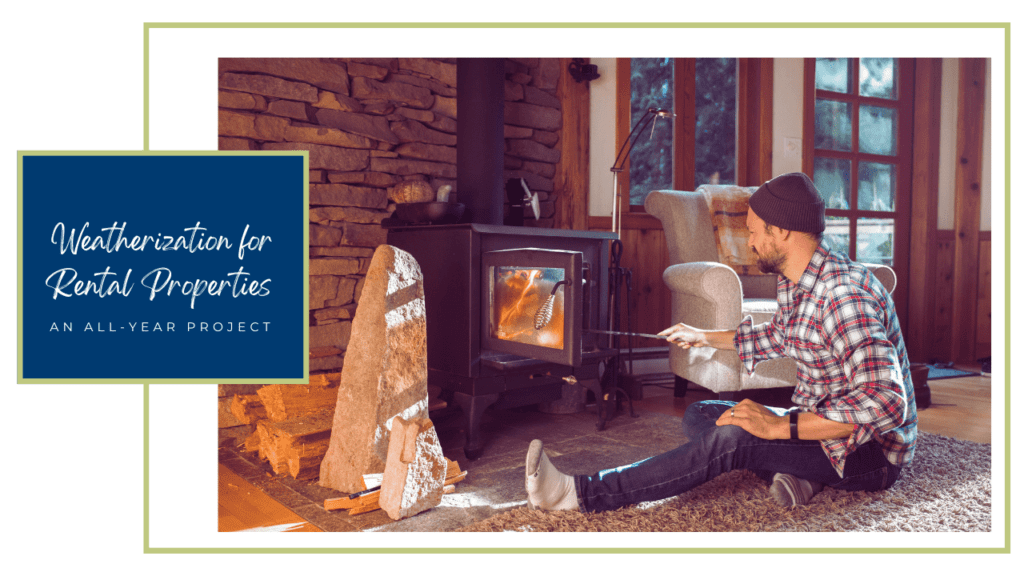
Talking about the weather is fairly common. The weather impacts the rental industry, as you know. Fewer people are willing to move in the thick of winter, and leasing seasons have their cycles. There’s also the attention that’s needed to seasonal maintenance. Who is shoveling and plowing the snow at your rental properties in the winter? How are you handling irrigation and landscaping in the summer? Are the gutters clean? Will the roof leak? Weather impacts all of these questions.
At ManCo Property Services, we’ve talked about winterizing Dayton rental properties. If you have not already checked out our blog on this topic, we welcome you to read it on our website. It has a lot of valuable information on how to protect your investment when the temperatures drop and the ice settles in.
Today, we want to talk about a related but very different topic: weatherization.
What’s the difference, and why does it matter?
We’re going to tell you. We’re also going to explain how weatherizing your rental property is something you’ll want to pay attention to all year long.
Winterization vs. Weatherization and Dayton Rental Properties
Weatherizing your Dayton investment property is not the same as protecting your rental home from snow and ice and freezing wind and bone-chilling temperature drops.
Instead, weatherization is more about overall sustainability and how to save money and resources when it comes to energy and utility bills. You can increase the overall value of your investment property by making some key upgrades and renovations to furnaces, water heaters, insulation, and other systems and functions.
According to the U.S. Department of Energy, weatherization can be defined as this:
“Weatherizing your home helps you save money by saving energy, and it can also improve the comfort of your home. Professionals who perform weatherization services are part of the “Home Performance” industry. They are trained to understand how a house works as a system and to offer solutions that can solve common and difficult problems using building science.” (www.energy.gov)
The Department of Energy recommends that you conduct a home energy audit to start building your strategy for weatherizing your property. Once you’ve completed an assessment, you can begin to learn about air sealing, insulation, moisture control, and ventilation.
At ManCo Property Services, we’ve been preparing for work like this at all of the rental properties we manage, and we can help. We have been partnering with the nonprofit group Dayton Energy Collaborative to ensure that our weatherization assessments and action items are working.
We want you to know how we’re approaching the weatherization of your investment property, and why it’s important.
Energy Efficiency in Dayton Rental Homes and Tenant Outreach
We’re asking our tenants to help us weatherize the homes they’re living in, and they’ve been receptive because of the money it can save them on utility bills. Every tenant gets a letter that invites them to consider whether they’re eligible for government-funded weatherization projects that will not cost them anything and lower their energy bills.
We let them know that our goal is to help reduce utility bills and improve living conditions. If tenants are eligible (it’s income-based), we can initiate and oversee projects such as:
- Furnace replacement/repair
- Insulation updates
- Air sealing
- Installing programmable thermostats
- Hot water tank replacement/repair
Eligibility begins at 300% of the Federal Poverty Guideline, and many of our tenants can meet those requirements.
Elements to the Home Assessment Checklist
The program aims to evaluate the property first. Before any weatherization updates and improvements are made, we start with a home assessment checklist. On that checklist, we ask for some basic information, such as whether the property feels comfortable during the cold winters and the hot summers. We need to know if it feels drafty during the winter or if the air conditioning never seems to make the home feel cool enough in the summer.
If there are specific concerns, there’s space to talk about them. Maybe space heaters are always needed to keep rooms warm in the winter. Or, perhaps electric and gas bills tend to peak at specific times.
The assessment will also provide a list of disqualifiers, which will require your attention. These include, but are not limited to:
- The presence of mold or standing water
- Asbestos
- Hazards with electrical or plumbing systems
- Lead-based paint surfaces that have deteriorated
- Pets who may be in the home and disruptive
- Pre-existing issues
- The presence of toxic chemicals or illegal substances
- Sewage or animal feces in the home
The exterior of the building will also need to be considered before any weatherization programs are put into place. The program will need to know about cracks, holes, or openings. Information will be collected about gutters and whether water is graded away from the building. What kind of roof do you have and are there any issues with shingles or sagging? You’ll need to indicate what kind of materials your walls are made with and what kind of foundation we’re working with.
Windows, lighting, mechanicals, and electrical systems will all be assessed. There are considerations around ventilation and the flow of water through faucets, pipes, and plumbing. We’ll need to consider the smoke detectors, carbon monoxide detectors, and the insulation at your property. What kind of light bulbs do you use and how often are air filters replaced? Do squirrels like to nest in your attic?
As you can see, it’s a very thorough assessment. Don’t be put off by what’s required; we’re here to manage the particulars and the details, and to keep you informed throughout the entire process.
 Let’s not wait until winter when we’re thinking about weatherization. This is an all-year project and priority. We recommend a complete evaluation or a home assessment that shows us where your investment property is right now in terms of energy usage, sustainability, and waste. Then, we can come up with a specific plan for you that aligns with your investment goals as well as your commitment to weatherization.
Let’s not wait until winter when we’re thinking about weatherization. This is an all-year project and priority. We recommend a complete evaluation or a home assessment that shows us where your investment property is right now in terms of energy usage, sustainability, and waste. Then, we can come up with a specific plan for you that aligns with your investment goals as well as your commitment to weatherization.
Contact us at ManCo Property Services.
